
The Business of Fashion
Agenda-setting intelligence, analysis and advice for the global fashion community.

Agenda-setting intelligence, analysis and advice for the global fashion community.
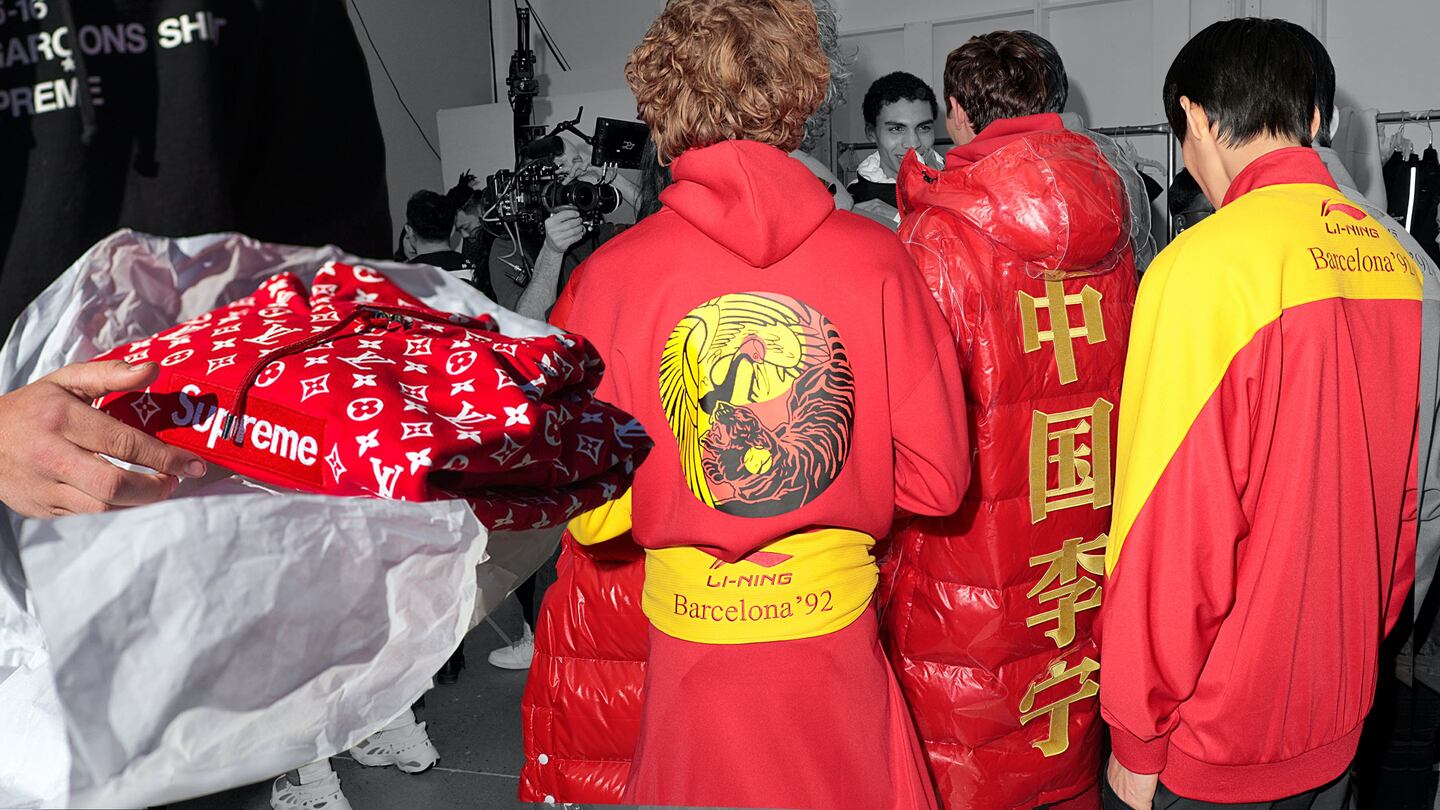
Hello BoF Professionals, welcome to our latest members-only briefing. China’s colossal size and dynamism makes it a top priority for any global business, but it remains opaque to many in the fashion industry. Leveraging our rare access and local knowledge, the BoF China team demystifies the Chinese market with weekly industry analysis and the wider socio-cultural context you need to sharpen your focus.
BEIJING, China — West of Tiananmen Square and south of Chang'an Street, The Great Hall of the People dwarfs even the more impressive buildings in its vicinity, the sprawling Forbidden City included.
This week during the annual National People’s Congress, the decisions made within its walls will be the talk of the town. As one of many policies brought up during the ten-and-a-half-day session, Chinese officials discussed measures to better protect foreign companies, a concession born of the ongoing trade war with the United States.
Alas, the measures — which include tougher enforcement of foreign patents and the prevention of forced technology transfers — are geared towards tech and innovation, and unlikely to be of much help to fashion brands.
ADVERTISEMENT
It’s no secret that the limitations of Chinese trademark law — which have plagued brands such as Hermès, Air Jordan, Boy London and New Balance — have long been a pain point for foreign companies. But as local brands continue to revamp themselves for a younger, global audience, the problems once felt solely by prestigious foreign designers are being felt across the board.
Domestic trademark squatters — intellectual property rights infringers who register businesses' trademarks as their own — have become even more aggressive in the wake of China's e-commerce boom, says Carol Wang, a civil litigation lawyer at Lusheng law firm who helped New Balance win a historic trademark victory in the country. New Balance was awarded over 10 million yuan compensation for trademark infringements in a 2017 case.
That’s thanks to first-to-file laws that give trademarks to whomever is quickest to claim them, irrespective of use in China or elsewhere.
In many cases, these trademark squatters will go on to utilise said intellectual property rights for commercial purposes, by selling knock-offs on online marketplaces such as Alibaba-owned C2C giant Taobao. In extreme cases, squatters show their registered trademark certificates to online platforms to prevent brands from having them pulled from websites when complaints are filed.
Sportswear giant Li-Ning has previously been accused of copying foreign behemoths: its logo was deemed a copy of Nike's seminal swoosh, and its slogan "Anything is Possible" was called a knock-off of Adidas' "Impossible is Nothing." In 2010, it finally unveiled its new logo and slogan to differentiate it from global rivals.
However, Li-Ning's trademark-related woes were far from over. In a twist of fate, the brand is now fighting to defend its own trademark in China. The brand now includes QR code stickers on its products to verify their authenticity — one of many technological solutions it is pursuing to defend its intellectual property.
Right now the tendency is, when in doubt, reject.
Li-Ning isn’t suffering solo. “We’ve been approached by an increasing number of Chinese clients for the same issue,” says Wang.
The legal department of Chinese sportswear label Anta said the brand carries out its own investigations and files lawsuits to protect its IP, as well as taking non-legal actions such as expanding its sales and marketing efforts to “help consumers more easily and conveniently purchase our genuine products, squeezing out space for fakes.”
ADVERTISEMENT
Anta said, “We look forward to a future when malicious applications for similar trademarks will be brought under better control, protecting businesses in a positive operating environment.”
The problem hasn’t been solved for foreign players either. Last year, Samsung China announced a collaboration with Supreme Italia only to find that the latter had no affiliation with the hyped street wear brand founded in New York City in 1994, and the collaboration was cancelled soon after.
In China, Supreme doesn’t yet hold the trademark for the iconic Supreme box logo — white futura heavy oblique text on a red box — though an application appears to be pending. There are dozens of Supreme “official accounts” on WeChat. Even the URL "www.supreme.cn" is being held for a $100,000 ransom. And while Supreme New York does at least have a verified Weibo account with over 90,000 followers compared to Supreme Italia’s six, that didn’t stop Samsung from being duped by the knockoff in their eagerness to cash in on Supreme’s popularity in China.
What’s done is done, but is there any hope for change? As home-grown stalwarts such as Li-Ning promote Made in China credibility abroad, the needs of domestic Chinese brands could motivate better policy protections, says Matthew Dresden, an attorney at law firm Harris Bricken and contributor to the China Law Blog.
Rather than reforming laws, Dresden said existing protections need to be more effectively enforced by examiners with improved training. “It’s an assembly line approach and there’s very little thought that’s going into the examination,” he said. “Right now the tendency is, when in doubt, reject.”
“Being much better at rooting out these bad faith applications would redound to the benefit of Chinese companies as well,” Dresden tells BoF, a factor Beijing is surely less likely to ignore.
时尚与美容
FASHION & BEAUTY
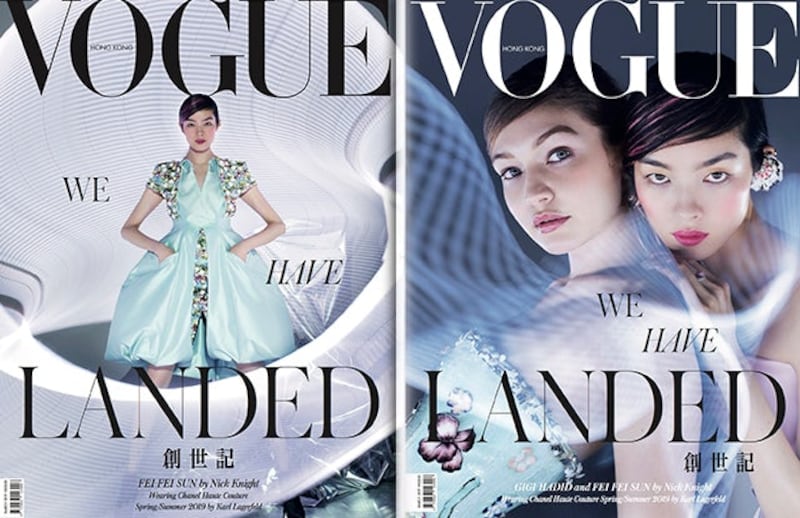
Vogue Hong Kong's cover reveal | Source: Courtesy
ADVERTISEMENT
Vogue Hong Kong’s Hadid Cover Spurs Outrage
Vogue Hong Kong's debut made a splash, though perhaps not as intended. The magazine unveiled its long-anticipated debut covers featuring American model Gigi Hadid and Chinese model Feifei Sun on Instagram Friday. The reveal triggered a slew of comments across social media — many cited Hadid's alleged racism against Asians, and the fact that she "has nothing to do with Hong Kong's history" — and the Instagram post featuring Gigi's solo cover was deleted soon after. Additionally, publisher Desiree Au's response to WWD's Hadid-related questions of "what happens in Hong Kong is completely independent than other places in the world" was interpreted by Chinese netizens as an inflammatory anti-mainland statement. While Sun's appearance was comparatively well-received, netizens deemed the styling of Chanel haute couture pieces passé, and pointed out similarities between it and Vogue China's April edition (posted by editor-in-chief Angelica Cheung only 48 hours prior), also featuring Sun clad in Chanel haute couture. (Weibo, SCMP)
Calvin Klein Debuts Women’s Day Campaign in Asia
Ahead of International Women's Day on March 8, Calvin Klein has sent out an empowering ad campaign for Asian women, entitled "My Statement #MyCalvins" featuring influencers and celebrates including Chinese model Bonnie Chen, Indian model Anjali Lama and Singaporean actress Victoria Loke dressed in the brand's activewear sans makeup. Though Calvin Klein has launched female-focused campaigns in the US, this is its first feminist foray in the region and highlights the American brand's plans to expand its business in the East. (Jing Daily)
JNBY’s Noteworthy Start to 2019
Chinese fashion group JNBY is on a roll. The company published figures on February 27 for the six months ended December 31, revealing a 22.6 percent year-on-year rise in profits with net profits reaching 381 million yuan (around $56.8 million). Users with memberships — who contributed to 70 percent of retail sales — had hit 3.1 million, 2.6 million of which were via WeChat. The results were published a day after JNBY launched its newest menswear brand A Personal Note 73, its third new offering in the past 12 months. According to the group, A Personal Note will be "all about personality" and target young fashion enthusiasts looking for well-designed clothes at a high street price point — hardly a surprise, considering the success of its influencer and social media-heavy marketing strategies. (BoF China)
科技与创新
TECH & INNOVATION
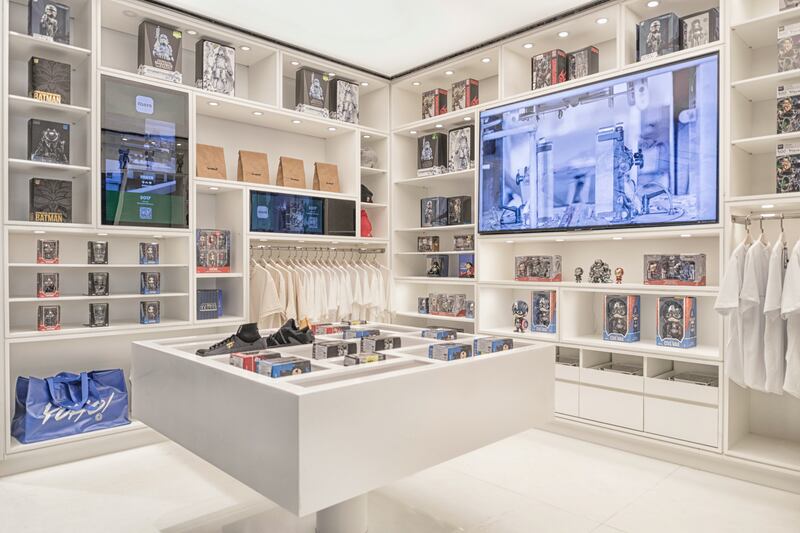
Yoho!'s bricks-and-mortar store | Source: Courtesy
Blockchain Boosts Yoho!’s Sneaker Trade
Chinese streetwear stalwart Yoho!'s sneaker trading marketplace UFO is harnessing the power of blockchain to authenticate transactions across its platform. Announced February 28, the Ultrain-built blockchain will provide a sneaker traceability solution: an independent appraisal team labels sneakers with tags, which record data relating to authenticity, origin and chain of custody, and are then registered on Ultrain's public chain for end users to access. Despite China's high demand for streetwear and sneakers in particular — US-based sneaker trading platform StockX reports that 15 percent of its users are based in the Middle Kingdom — its resale market has yet to catch up to the West due to the lack of sophisticated appraisal systems to guarantee authenticity. Hence, UFO's blockchain-powered solution could change the game. (Ultrain)
WeChat’s Greatest Threat is WeChat Itself
With over 1 billion daily active users, Tencent-owned WeChat is the undisputed hegemon of Chinese apps. But could its status be in danger? According to Tech in Asia the biggest threat to WeChat can be encapsulated by a sociology term coined by ecologist Garrett Hardin, "The Tragedy of the Commons," where over-grazing on grasslands increases the burden on soil, decreasing fulfilment for organisms living relying upon it. Perhaps this is why the app's founder Allen Zhang has said, "our attitude toward users must be one of kindness, not simply one of routine." Rather than having traffic "stolen" by fresh new rivals, perhaps WeChat's weakness lies in its strength and the stagnancy that users could encounter if the platform is no longer to offer them support new experiences. (Tech in Asia)
The State of China’s Mobile Payment Wars
It's not news that e-payments are just one part of Alibaba and Tencent's tech and retail rivalry, but new figures are illuminating the real scale of the market. Virtual payment use increased by 24 percent year-on-year in 2018, and 54 percent of consumers are using apps such as AliPay and TenPay (which facilitates WeChat Pay) rather than credit and debit cards (25 percent) and cash (21 percent). Furthermore, Tencent recorded 460 billion annual transactions last year, far exceeding Alibaba's 197.5 billion. The former's TenPay has 910 million users while Alibaba's AliPay has 740 million, but 64 percent of their total users use both payment platforms. (WalktheChat)
消费与零售
CONSUMER & RETAIL
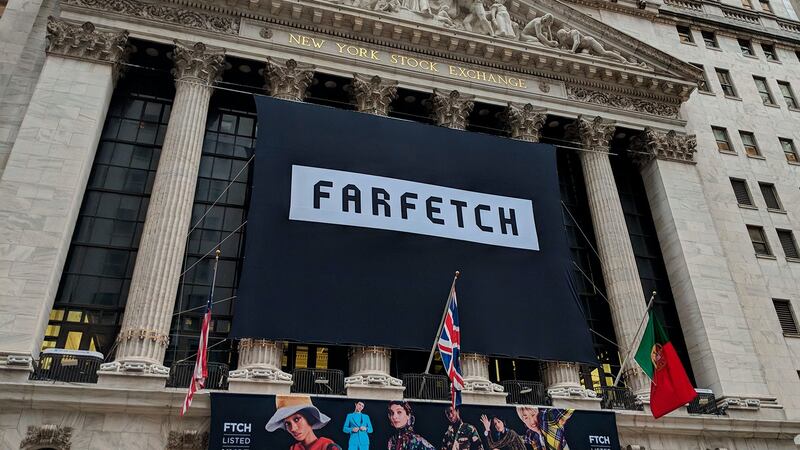
Source: Shutterstock
Why Did JD.com Sell Toplife to Farfetch for $50 Million?
Following Thursday's news of the so-called "win-win" transaction, many are questioning whether Toplife — which had only been founded in late 2017 — had been meeting JD.com's expectations. Both Alibaba-owned Tmall and JD.com founded their respective luxury fashion arms to mirror western luxury players (Net-a-Porter, Farfetch) and target a higher income tier of consumers, but Tmall had the first mover's advantage and now the product volume and brands to prove it. As opposed to Luxury Pavilion's members-only model that attaches it to Tmall's interface, Toplife operates more independently from JD.com, and follows a logistics-focused marketplace model (not unlike Farfetch), making it an ideal acquisition considering the companies' long-standing relationship. What's more is that luxury e-commerce is no piece of cake: a highly segmented market, unpredictable consumer habits, high price sensitivity and lack of brand loyalty mean JD.com may have found that creating their own Farfetch was not worth the hassle. (Jiemian)
Yuyuan and Fosun Acquire Tom Tailor
It was announced on February 27 that Yuyuan Group and Fosun International have joined forces to acquire struggling German fashion chain Tom Tailor. Fosun's takeover bid for the Frankfurt-based player has been years in the making, and the Chinese giant has held a stake in the company since 2014, soon followed by Tom Tailor's first Chinese retail store opening in 2015. According to Jiemian, Fosun now directly and indirectly holds a 35.35 percent stake in the German company, and the company is to continue to shift its strategic focus from Europe to the Middle Kingdom. However, a fast fashion brand's journey to China can be a hit or miss — just ask H&M or Topshop — and competition will be fierce. (Sina Finance)
Bosideng Hits 10 Billion Yuan in Sales
According to recent results for the fiscal year ended February 25 published by China's leading down manufacturer Bosideng, the company's sales for down-related goods hit 10 billion yuan (around $1.49 billion) during the period, equal to 35 percent year-on-year growth. Bosideng cites a new fashionable brand image for its boost in sales, as well as price hikes on its outerwear averaging at 20 to 30 percent. Considering that higher and lower-priced rivals such as Moncler, Canada Goose, Uniqlo and 'Amazon coat'-maker Orolay will be fighting for consumer's wallets, all eyes are on how Bosideng plans on diversifying its offerings to build a more well-rounded brand. (BoF China)
政治、经济、社会
POLITICS, ECONOMY, SOCIETY
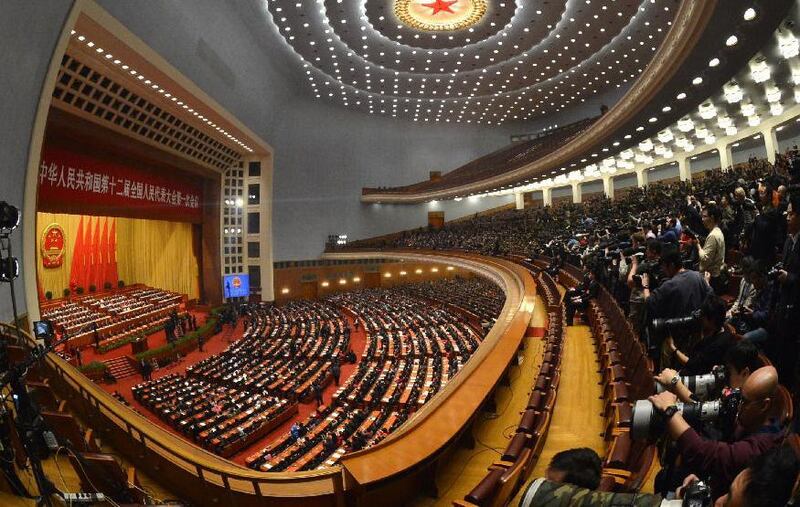
Beijing's Great Hall of the People | Source: News.CN
At The NPC, Beijing Lets the Numbers Do The Talking…
China's National People's Congress (NPC, aka the Two Sessions) began Tuesday, at which Chinese premier Li Keqiang stated Beijing's plans to attract foreign investment to China's shores by further relaxing controls over market access, while abiding by internationally accepted trade rules to encourage fair competition. Ongoing until March 15, there remains a lot to be discussed at the NPC, but impressive numbers have already been dropped in Li's annual work report. Last year, China's GDP exceeded 90 trillion yuan, a tenfold increase over the past twenty years; an average of over 18,000 new businesses were launched daily in 2018; more than 14 million people from rural areas moved to urban cities permanently; and over 13.61 million new urban jobs were added. (Bloomberg)
Policymakers To Debate Women’s Reproductive Rights
In China, single women can't access assisted reproductive services such as IVF or egg-freezing, but Huang Xihua is trying to change that. A women's rights advocate and official from Guangdong in China's parliamentary body, Huang is proposing a new policy allowing unmarried women equal rights to have babies. As of now, women that give birth as single mothers in some provinces are slapped with a hefty fine and can be denied access to public schools and social welfare. At the NPC, Huang will cite China's population decline to urge the government to abolish the discriminatory policies, and her plans have already ignited fierce debates online. (Inkstone)
Virtual Idols, Real Profit
Though the west is no stranger to virtual influencers, China's virtual idols are taking the concept to the next level. Digital avatars with unique voices and personalities are rising in popularity, and the country's most popular virtual idol Luo Tianyi recently took the stage at Shanghai's Mercedes-Benz arena with world renowned pianist Lang Lang to perform for thousands of fans. The virtual idol trend has gone from a subculture (influenced by Japanese virtual idols) to the mainstream, and the Chinese industry now consists of 30 to 40 holographic celebrities. Though Luo is first local virtual face to make a profit — she's been tapped by the likes of Pizza Hut and make up brand Pechoin — the industry is expected to grow from 100 million yuan (around $14.9 million) in 2018 to 1.5 billion yuan (around $223.7 million) by 2023. (SCMP)
China Decoded wants to hear from you. Send tips, suggestions, complaints and compliments to zoe.suen@businessoffashion.com.
With consumers tightening their belts in China, the battle between global fast fashion brands and local high street giants has intensified.
Investors are bracing for a steep slowdown in luxury sales when luxury companies report their first quarter results, reflecting lacklustre Chinese demand.
The French beauty giant’s two latest deals are part of a wider M&A push by global players to capture a larger slice of the China market, targeting buzzy high-end brands that offer products with distinctive Chinese elements.
Post-Covid spend by US tourists in Europe has surged past 2019 levels. Chinese travellers, by contrast, have largely favoured domestic and regional destinations like Hong Kong, Singapore and Japan.